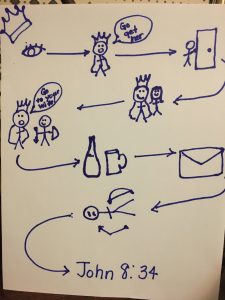My husband, Glenn, is sharing these daily lessons for our West Huntsville family as we are necessarily (because of the virus) spending less time physically together in worship, study and fellowship. We may be “socially distanced,” but we’re a close-knit family and we want to keep it that way! One way to stay on track together, spiritually, is to think about a common passage and make applications for our lives together even when we are unable to assemble as frequently. I’m sharing these daily family lessons here for those in other places, whose families (or even congregations) might benefit from a common study in these uncommon days of semi-quarantine. There are Family Bible Time guides included, as well. You can adapt, shorten or lengthen them according to the ages of kids (and adults) in your family. Blessings.
From Glenn:
 My Favorite Proverbs: When it’s wrong to join hands (Prov. 11:21, KJV). April 16.
My Favorite Proverbs: When it’s wrong to join hands (Prov. 11:21, KJV). April 16.
“Though hand join in hand, the wicked shall not be unpunished:but the seed of the righteous shall be delivered.”
We aren’t shaking hands during social distancing, but that has nothing to do with this profound proverb. It means this: I must not allow myself to be anesthetized to the seriousness of sin by observing the broad acceptance of sin. Wrong actions do not gradually become less wrong as they grow in popularity. Furthermore, it doesn’t matter how many men and women declare a lost man to be saved; he’s still lost until he comes to Christ. Other people—their words and actions– aren’t the yardstick to measure right and wrong. Paul wrote, “For we dare not class ourselves or compare ourselves with those who commend themselves. But they, measuring themselves by themselves, and comparing themselves among themselves, are not wise” (2 Cor. 10:12).
The greatest example of choosing not to “follow a multitude to do evil” (Ex. 23:2) is in Daniel 3 and has to do with the masses of people contrasted with three young, courageous, and determined men, Shadrach, Meshach, and Abed-Nego. What an opportune time to do the wrong thing and go along with the idolatry commanded by Nebuchadnezzar; but these three would not bow themselves and break the commandment of Jehovah (Ex. 20:3-5).
Christendom at large has declared that, in order to be saved, a man must simply pray the “sinner’s prayer”, and that his baptism has nothing to do with his being saved. In fact, most self-identified Christians today would be shocked to learn that there even exists a church which believes and teaches that immersion in water is necessary to be saved. The majority is opposed to what the Spirit, through Peter, taught us, “There is also an antitype which now saves us—baptism (not the removal of the filth of the flesh, but the answer of a good conscience toward God), through the resurrection of Jesus Christ” (1 Pet 3:21).
It is popular to believe that we all need to be in a church because we need a support group with which to connect or because our children need a religious background. Based merely on these kinds of objectives, almost any church will do. It matters little what is taught or what is done in the worship presented to God. The pivotal question is, “Do you feel comfortable here?” Clearly a great majority supports that view. Jesus stood in opposition to this when He said, “And I also say to you that you are Peter, and on this rock I will build My church, and the gates of Hades shall not prevail against it” (Matt. 16:18). Paul would later write, “but if I am delayed, I write so that you may know how you ought to conduct yourself in the house of God, which is the church of the living God, the pillar and ground of the truth” (I Tim. 3:15).
Similarly, the popular view of sexuality and morality is both broad in scope and at the same time, utterly inconsistent with Scripture (Matt. 5:28, Rom. 1:26-27, Gal. 5:19-21).
You can think of other examples.
The point of this proverb is simple: “Though hand be joined in hand…” that is, although there may be a clear majority may adopt a belief and/or lifestyle that is oppositional to Scripture, and although the proponents of that adoption may declare that God must/will surely be happy with said belief, it is, nonetheless, sinful.
We must never follow a multitude to do evil, even if the multitude is united (have joined hands) to support it (Ex. 23:2).
“All Scripture is given by inspiration of God, and is profitable for doctrine, for reproof, for correction, for instruction in righteousness, that the man of God may be complete, thoroughly equipped for every good work” (2 Tim. 3:16-17).
Family Bible Time with Glenn and Cindy
Tonight’s reading is to the point and is from 2 Samuel 12:14-16.It is amazing that this man after God’s own heart has slowly, but surely progressed to the point at which he had now plotted to take the life of (to effectively murder) the husband of Bathsheba to cover up his sin with her. Explain to your children what happened in these three verses. Emphasize to your children that David could have never imagined, when he was walking on the roof that night, that he would murder this soldier who’s been loyal to him in every way. But sin is like that. At first, we just do something we think is not so bad. But then we do something else to “cover up” the first thing we did. And the things we do keep getting worse and worse until we are in big mess of sin. The devil loves for that to happen to us. Tonight let’s think about some things we can learn from this awful cover-up-sin that David committed.
- Uriah took his own death orders to the captain of the army. Notice just how much David trusted Uriah. He knew that Uriah would not open the envelope on his way back to the battleground. Talk to your children about how guilty David must have felt when he handed Uriah the letter.
- Once again, David asked someone else to do a very wrong thing. Who, in this account, did a very bad thing in order to obey David? Should Joab have disobeyed the King, since he knew the plan was for Uriah to die? Discuss this ethical question with your children.
- Show your young children a drawing of an eye. From the eye (David’s lustful eye), draw an arrow to a drawing of David’s mouth speaking. From David’s mouth draw an arrow to a door. From the door, draw an arrow to stick figures of David and Bathsheba together. From those figures draw an arrow to a drawing of David talking to Uriah and from that drawing, an arrow to a wine bottle and a glass of wine. From there, draw an arrow to an envelope (David’s message to Joab) and, from there, an arrow to a dead stick figure. At the bottom have the citation: John 8:34. Use this drawing to emphasize the progression of sin to your kids. It should look roughly like this (only you should draw your own as you are explaining the descent).
 When you get to the verse read it and elicit, from your kids, ways that we become slaves to sin. Was David a sort of slave to sin?
When you get to the verse read it and elicit, from your kids, ways that we become slaves to sin. Was David a sort of slave to sin? - Lastly, talk to your children about a staircase. Take them to the top of the stairs if you have them in your home. Ask them what would happen if you threw them over the railing to the floor below. Then explain to them that they travel the same distance down if they take on step at a time down the stairs; but when they go one step at the time, they don’t even notice that they’ve descended. That’s how sin is: if we just go a little at the time, we can do very sinful things and not even notice how wicked we have become. Of course, the lesson you leave with them is that we guard ourselves against small compromises. We see the devil’s deceit and avoid playing his little one-step-at-the-time game.
Quote the KidSing rule again: Do the right thing.
Read Ephesians 6:11 and tell your children that the word “wiles” there means trickery or deceit.
Pray for wisdom to always see the devil for what He is and for strength to always resist His trickery.



